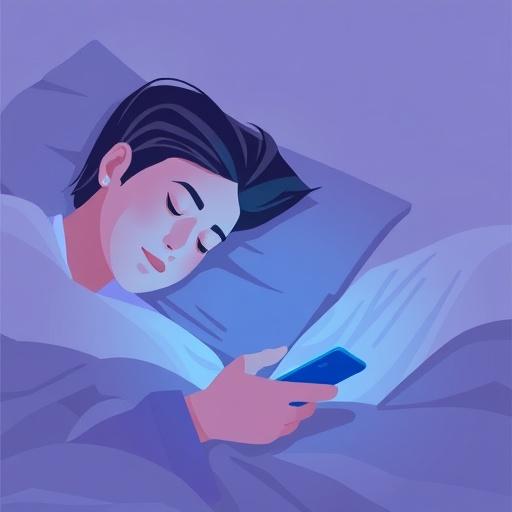In the bustling world of academia, where the pursuit of knowledge often intertwines with the incessant connectivity of technology, a groundbreaking study sheds new light on the intricate relationship between smartphone addiction, academic performance, and sleep quality among nursing students in Morocco. This research, notably a cross-sectional study, presents compelling evidence that may alter how educational institutions and students approach the phenomenon of smartphone use and its potential ramifications on health and academic success.
Smartphones have become an integral part of daily life, particularly among students who rely on these devices not only for communication but also for accessing educational resources and managing their social lives. However, the over-reliance on smartphones, often termed smartphone addiction, poses significant concerns. As nursing students navigate a demanding curriculum, their use of smartphones could either serve as a tool for efficiency or become a detrimental distraction. This duality warrants further investigation into how such technological dependencies impact their academic performance and overall well-being.
The study conducted by Haddaouy et al. delves into the mediating role of sleep quality in this dynamic. Poor sleep quality has long been associated with decreased cognitive function, lower academic performance, and increased stress levels. The researchers hypothesized that smartphone addiction negatively influences sleep quality, which in turn adversely affects academic performance. This multifaceted relationship highlights the importance of understanding how technology use might indirectly shape students’ learning experiences and outcomes.
Through a meticulously designed methodology, the researchers surveyed a sample of nursing students across various institutions in Morocco. The participants were assessed for their level of smartphone addiction, sleep quality, and academic performance indicators. By utilizing validated measurement tools, the study ensured that the data collected was both reliable and relevant. The findings underscore an alarming trend: as smartphone addiction levels increase, sleep quality tends to deteriorate, leading to notable declines in academic performance.
This research corroborates existing literature that has pointed toward a worrying association between extensive smartphone use and disrupted sleep patterns. One might consider how the blue light emitted from screens can interfere with the body’s natural circadian rhythms, making it increasingly difficult for students to achieve restful sleep. The data illuminated in this study shows that many nursing students reported poor sleep quality, which was evident from their self-reported academic struggles.
Additionally, the study’s findings reveal that students who consciously limited their smartphone usage during nighttime hours tended to report better sleep quality and improved academic performance outcomes. This aspect of the research opens doors to potential interventions that educational institutions can implement. Strategies encouraging students to adopt healthier tech habits, such as establishing boundaries for nighttime smartphone use, could prove beneficial in enhancing both sleep and academic success.
The implications of this research extend beyond the confines of a classroom or a specific region; they resonate with broader global trends in smartphone utilization among youth. With the student population increasingly embracing digital technology, understanding the potential negatives becomes imperative. Thus, educational initiatives aimed at promoting digital literacy and healthy technology use can play an essential role in mitigating the factors that lead to smartphone addiction.
Moreover, the study’s findings raise an important question about responsibility in the digital age. Are educational institutions failing to prepare students for the challenges posed by smartphone use? Are there inadequate discussions regarding the balance between technology use and academic commitments? The time has come for more comprehensive educational strategies that incorporate discussions around technology use, mental health, and academic performance, rather than treating these as isolated issues.
As the research establishes the mediating role of sleep quality in the nexus of smartphone addiction and academic performance, it compels educators and policymakers to rethink how technology is integrated into student life. This study serves as a clarion call for universities to explore innovative solutions that encourage healthy smartphone habits while fostering academic excellence.
In conclusion, the work of Haddaouy and collaborators highlights a critical intersection where technology, health, and education converge. By drawing attention to the importance of sleep quality in the backdrop of smartphone addiction, this research not only contributes to the growing body of literature in this domain but also prompts necessary conversations about the future of education in a digital world. For nursing students, the ramifications are particularly significant as they prepare to enter a field where the implications of health and well-being extend beyond themselves to their future patients.
In essence, the ongoing discourse about smartphone usage in academic settings needs to be informed by research such as this. Only by recognizing the nuances inherent in modern technology use can we foster an educational environment conducive to both academic success and personal well-being.
Subject of Research: The relationship between smartphone addiction, sleep quality, and academic performance among nursing students in Morocco.
Article Title: Correction to: Mediating role of sleep quality in the relationship between smartphone addiction and academic performance among nursing students in Morocco: a cross-sectional study.
Article References:
Haddaouy, A.E., Blaak, H., Elkhalladi, J. et al. Correction to: Mediating role of sleep quality in the relationship between smartphone addiction and academic performance among nursing students in Morocco: a cross-sectional study.
BMC Nurs 24, 1401 (2025). https://doi.org/10.1186/s12912-025-04114-5
Image Credits: AI Generated
DOI: 10.1186/s12912-025-04114-5
Keywords: smartphone addiction, sleep quality, academic performance, nursing students, Morocco, digital technology, education.




